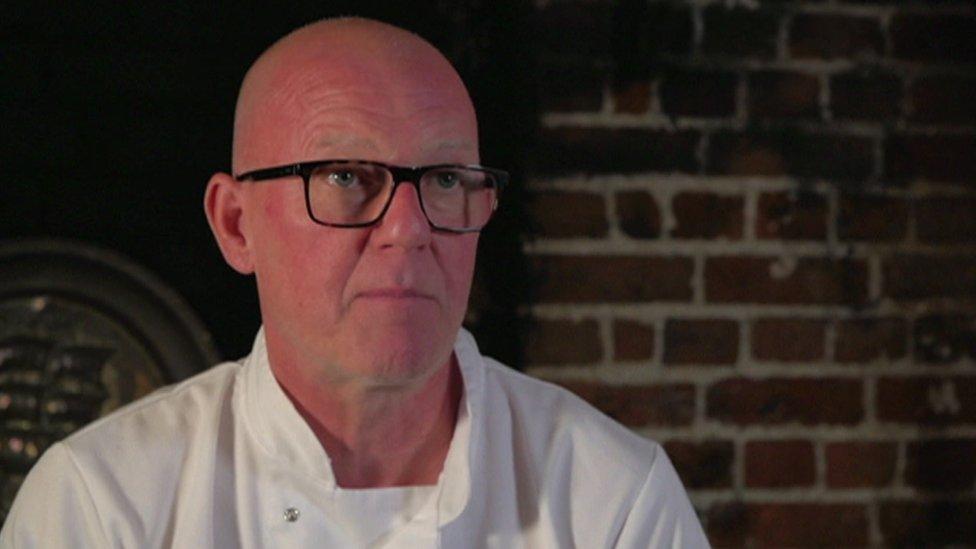Energy bills: 'My supply fee has gone from 29p to £4 a day'
- Published

Emma (right) runs the Blue Ball inn with her husband Carl and her staff
Emma Shepherd is one of many pub landlords searching for the best energy deal as her costs continue to soar.
But each quote includes a hike to her standing charge - the fixed daily fee to suppliers - with one saying it would rise from 29p to £4 a day.
UK Hospitality said restaurants, pubs and bars were being hit with 600% rises in standing charges with "absolutely no justification or explanation".
But the trade body for energy firms said charges were higher due to costs.
Energy regulator Ofgem told the BBC it was "aware" some businesses were being asked to pay additional costs. It said it was looking to see if action was needed.
Mrs Shepherd, 52, who runs the Blue Ball Inn near Sheffield said "nobody" could tell her why her standing charge had increased so much. The pub had already closed its kitchen on Mondays and Tuesdays to reduce running costs, she said.
The British Beer and Pub Association said its members had reported costs "being layered onto bills". The extra costs, it said, included large deposits up front.
Scaled back
Unlike households, businesses are not covered by an energy price cap, which limits the amount suppliers can charge per unit of energy.
To shield companies from the spike in energy costs, wholesale electricity and gas prices have been fixed for pubs and many other businesses since October under government support.
But the standing charge element of the bills, which is the daily amount customers pay for the supply of energy, no matter how much is used, is not covered under the support.
From April, the current level of help is set to be scaled back. but price of wholesale gas, which is what suppliers pay gas companies, has also fallen in recent months from record levels last year.
Mrs Shepherd, who entered the pub trade with her husband Carl in 2019, has managed to stay afloat during Covid lockdowns, restrictions and the energy crisis so far as she had a fixed gas and electricity deal.
But when she looked to renew, she said her current provider only offered her a variable contract with a standing charge of £4 a day, when it used to be 29p.
The price per unit of energy has been also quoted at around 37p a day, up from 15p.
Mrs Shepherd said if she took this deal the pub would be looking at bills of up to £17,000 a year, up from between £8,000 and £10,000.
"I'm playing a game of poker with the energy companies," she told the BBC. "My electric and my gas is more than my rent which is crazy. I'm working harder to earn a lot less."
Although Mrs Shepherd might be able to get a fixed rate at a lower price than the variable one, she said being locked into a deal at a higher cost for years when energy prices were forecast to come down left her with a difficult decision.
'Misconception'
Chris Jowsey, the boss of Admiral Taverns, which has 1,600 pubs, called for energy firms to be held to account to "make sure they are not profiteering".
He warned "onerous" energy contracts put many pubs at risk of closure.
Energy UK, the trade body for suppliers, said it was a "misconception to imply that standing charges are rising to compensate for unit prices being capped".
A spokesman said one reason why standing charges had gone up was because the costs associated with the wider network to transmit and distribute energy had risen.
He added another reason for higher network charges was due to costs resulting from suppliers going bust, which many, mostly smaller firms, did when wholesale prices surged.
Last summer, energy watchdog Ofgem was accused by the National Audit Office of allowing a market to develop that was vulnerable to large shocks.
While Ofgem accepted some failings, it said it had been dealing with a "once-in-a-generation global energy price shock".
Action
In a letter to the Energy Secretary Grant Shapps, leaders in the hospitality industry called for the government to instruct Ofgem, the energy regulator, to enable energy contracts signed when prices were higher last year to be renegotiated, due to wholesale prices now being lower.
Ms Nicholls said half of businesses in the sector were locked into high-price deals and warned that thousands might not be able to afford bills when support is reduced from April.
She said if Ofgem could not enable businesses to be able to switch to cheaper deals, then the government should step in and maintain help at current levels, as it is expecting to do for households in next week's Spring Budget.
Ofgem told the BBC it was "aware" some businesses were having problems in getting fixed-rate energy deals as well as being asked to pay additional costs.
It said its priority was to ensure customers paid a fair price for energy and said it was looking to see if action was needed.
The government said Ofgem's review would include whether the regulator requires more powers.
It said the energy support for businesses meant they were paying around half of predicted wholesale energy costs this winter.
Related topics
- Published24 February 2023

- Published30 August 2022

- Published10 January 2023
